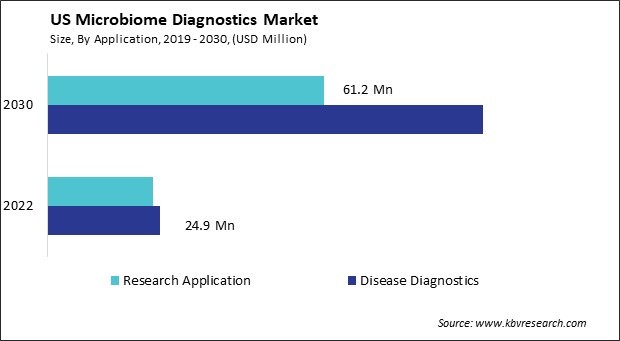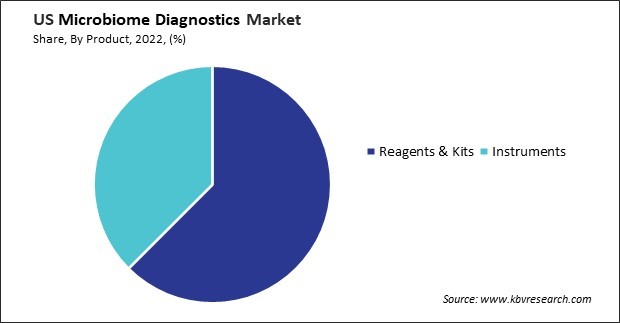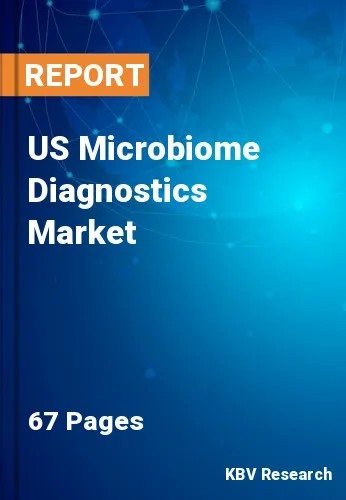The US Microbiome Diagnostics Market size is expected to reach $157.6 Million by 2030, rising at a market growth of 16.2% CAGR during the forecast period.
The microbiome diagnostics market in the United States has experienced significant growth in recent years. The microbiome refers to the diverse community of microorganisms that inhabit various body parts, such as the gut, skin, and oral cavity. One of the key drivers of the microbiome diagnostics market in the U.S. is the growing prevalence of chronic diseases, such as inflammatory bowel disease (IBD), obesity, and diabetes, which have been linked to dysbiosis or imbalances in the microbiome. Microbiome-based diagnostics offer the potential to identify biomarkers associated with these conditions, enabling early detection and personalized treatment strategies.

According to the Centers for Disease Control and Prevention, in 2021, diabetes affected approximately 38.4 million individuals across all age groups in the United States, accounting for 11.6% of the population. Notably, the prevalence of diabetes rose with advancing age, peaking at 29.2% among adults aged 65 years and above. This demographic trend underscores the significant potential for the microbiome diagnostics market in the U.S., particularly in addressing age-related health concerns such as diabetes.
Technological advancements have also played a significant role in driving growth in the microbiome diagnostics market in the U.S. Next-generation sequencing (NGS) technologies have revolutionized the ability to study the microbiome by allowing American researchers to sequence the DNA of thousands of microbial species simultaneously. In addition to NGS, other innovative technologies, such as metagenomics, metabolomics, and machine learning algorithms, are being increasingly utilized to analyze microbiome data and identify disease biomarkers.
The COVID-19 pandemic impacted the microbiome diagnostics market in the U.S. The pandemic has heightened awareness of the importance of immune health and the role of the microbiome in modulating immune responses. This has led to increased interest in microbiome-based interventions, such as probiotics and prebiotics, as well as diagnostic tests to assess the status of the microbiome. Additionally, the pandemic has accelerated the adoption of telemedicine and remote monitoring technologies, creating new opportunities for microbiome diagnostics companies to reach patients outside traditional clinical settings. However, the COVID-19 pandemic has disrupted healthcare systems and research activities, diverting resources from non-urgent medical procedures and research projects.
The microbiome diagnostics market in the United States is experiencing a surge in demand for non-invasive diagnostic techniques. Non-invasive diagnostics offer numerous advantages over traditional invasive methods, particularly in microbiome analysis. By avoiding the need for invasive sample collection procedures such as tissue biopsies, non-invasive tests reduce patient discomfort, minimize the risk of complications, and improve overall patient experience. This is especially crucial in microbiome diagnostics, where multiple samples must be collected over time to monitor microbial community changes accurately.
One of the primary non-invasive diagnostic techniques gaining traction in the microbiome diagnostics market in the U.S. is the analysis of biomarkers in biofluids such as blood, urine, and stool. These biomarkers provide valuable insights into the composition and function of the microbiome without the need for invasive procedures. For example, stool samples contain a wealth of information about the gut microbiome composition and are easily collected by patients in the comfort of their homes.
Additionally, advancements in sequencing technologies have enabled the development of non-invasive methods for characterizing the microbiome. Metagenomic sequencing of microbial DNA extracted from biofluids allows researchers to profile the microbiome with high accuracy and resolution without requiring invasive sample collection. Thus, non-invasive diagnostic techniques, particularly biomarker analysis in biofluids and metagenomic sequencing, are revolutionizing microbiome diagnostics in the U.S.
Personalized medicine, a groundbreaking approach tailoring medical treatment to individual characteristics, is revolutionizing healthcare. In the United States, one area witnessing a surge in interest is personalized medicine within the microbiome diagnostics market. Advancements in technology, particularly in high-throughput sequencing and bioinformatics, have enabled comprehensive microbiome analysis. This has unlocked a deeper understanding of its role in various conditions, including gastrointestinal disorders, autoimmune diseases, and even mental health conditions like depression and anxiety. As a result, healthcare professionals in the U.S. are increasingly recognizing the potential of microbiome diagnostics in guiding personalized treatment strategies.
Moreover, the microbiome is increasingly linked to drug metabolism and efficacy, emphasizing its relevance to personalized medicine. Variations in microbial composition impact the metabolism of certain drugs, affecting their therapeutic effects or predisposing individuals to adverse reactions. By integrating microbiome data into treatment decision-making, healthcare providers in the U.S. optimize drug selection and dosing for individual patients, enhancing efficacy while minimizing side effects.
The rise of direct-to-consumer microbiome testing kits has also contributed to the popularity of personalized medicine in this field. These kits allow Americans to explore their microbiome composition and receive personalized recommendations for improving health and well-being. Therefore, personalized medicine within the microbiome diagnostics market is reshaping healthcare in the United States, offering tailored treatment strategies based on individual microbial profiles.

The microbiome diagnostics market in the United States is experiencing significant growth and innovation, driven by technological advancements, increased understanding of the microbiome's role in health and disease, and rising demand for personalized medicine. One prominent company in the microbiome diagnostics market is uBiome, which gained attention for its direct-to-consumer microbiome testing kits. uBiome's kits allowed individuals to collect samples at home and receive detailed reports about the composition of their gut microbiome.
Another notable player in the microbiome diagnostics market is Second Genome, focusing on developing therapeutics and diagnostics targeting the microbiome to address various diseases. The company leverages its microbiome sequencing and analysis expertise to identify microbial signatures associated with specific conditions, such as inflammatory bowel disease and metabolic disorders. Through collaborations with pharmaceutical companies and academic institutions, Second Genome aims to translate microbiome insights into novel diagnostic tools and therapeutic interventions.
Meanwhile, Seres Therapeutics is pioneering the development of microbiome-based therapies for treating gastrointestinal disorders and cancer. The company's lead product candidate, SER-109, aims to prevent recurrent Clostridioides difficile infection by restoring a healthy gut microbiome. Seres Therapeutics employs advanced microbiome profiling techniques to identify microbial strains with therapeutic potential and rigorously evaluates their safety and efficacy in clinical trials.
Another key player is Bio-Me, which specializes in developing microbiome-based diagnostics for personalized nutrition and health management. The company's flagship product, GA-map™ Dysbiosis Test, analyzes the gut microbiome to assess microbial imbalances associated with various gastrointestinal conditions, such as irritable bowel syndrome and inflammatory bowel disease. By identifying specific dysbiotic patterns, Bio-Me aims to guide targeted interventions, including dietary modifications and probiotic supplementation, to restore gut health.
Additionally, DayTwo offers a microbiome-based platform for personalized nutrition recommendations, leveraging machine learning algorithms to analyze the gut microbiome's response to different foods. By profiling an individual's gut microbiome and predicting how it metabolizes specific nutrients, DayTwo provides tailored dietary guidance to optimize blood sugar levels and manage conditions like diabetes and obesity. From direct-to-consumer testing kits to comprehensive microbial profiling services, these companies are driving progress toward a deeper understanding of the microbiome's role in health and disease, ultimately transforming the healthcare landscape through personalized approaches to diagnosis and treatment.
By Application
By Product
By Sample
By Technology
By End User
Our team of dedicated experts can provide you with attractive expansion opportunities for your business.

